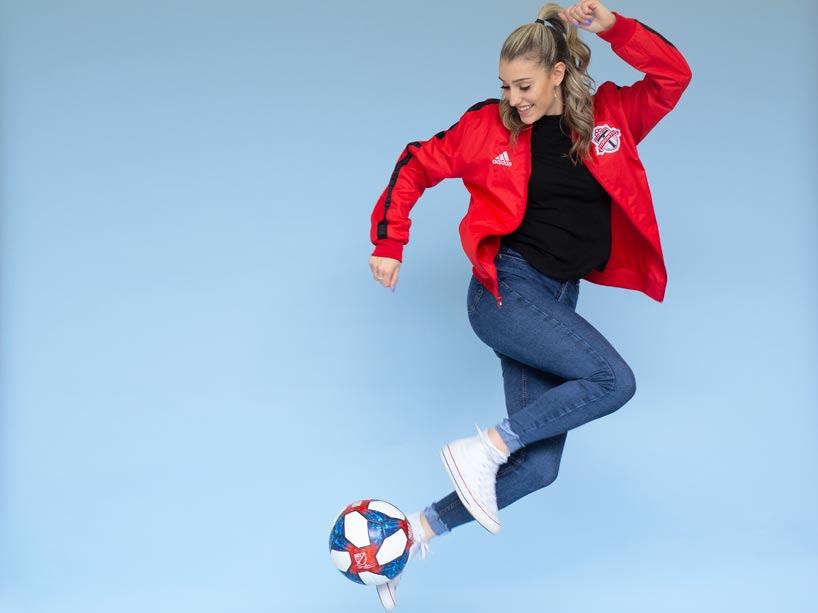Tech’s got game

Sport media graduate Maria Papadakis is the host of TFC TV. Photo credit: Natalia Dolan, image arts ’09.
This year, for the first time, the NBA gave fans the opportunity to be in the locker room with their favourite teams during the playoffs. How? Via its augmented reality app.
This is just the beginning, says Leah MacNab, senior director, marketing partnerships, NBA in Canada. “There is no end to the applications that are possible.”
Technology is touching all aspects of the business of sport and helping companies operate smarter, perform better and get closer to their customers and fans. Big Data, analytics, artificial intelligence, virtual reality, augmented reality, machine learning, quantum computing, Internet of Things, and mobile technology are creating more opportunity than ever before.
Recognizing that opportunity, Maple Leaf Sports & Entertainment (MLSE), partnered with Ryerson University to launch the Future of Sport Lab (FSL), an incubator that will empower seed-stage startups to pilot their technologies through MLSE’s recently launched innovation division: MLSE Digital Labs.
“We are working with MLSE to build a smart space to help innovative sport startups accelerate,” says Cheri L. Bradish, Loretta Rogers Research Chair in Sport Marketing at Ryerson’s Ted Rogers School of Management, and director of the FSL. “This is a paradigm shift in the way we can deliver sports-business education. The FSL will allow innovators to have direct access to Canada’s top sport and industry leaders, and will help elevate Toronto into one of the world’s leading sport ecosystems.”
The first cohort features six startups: Performance Phenomics, which delivers brain imaging assessments that offer scientific insight into the athlete’s performance and recovery; Rival.ai, an eSports company that uses AI to provide scouting reports; Spalk, a virtual sportscasting studio with hundreds of different commentators on live broadcasts; Stakes, which allows real-time sports wagering between friends; The Gist, sport news and experiences that are created by women for women; and Skill Sharks, an integrated coaching platform.
“We will leverage the ideas from FSL, implement them and see how successful they are in a real-life environment,” says Humza Teherany, chief technology and digital officer at MLSE. “Our objective is to find some of the best innovations in sports and entertainment.”
Teherany cites three mega trends involving sport:
- The fan experience as a journey and a product “Tech companies talk about user-centric design and getting the user experience right. For us, it’s fan-centric design or team performance-centric design where everything is driven by making the experience better for our fans and for our teams versus focusing on the technology itself.” To that end, MLSE now has product managers looking at every touch point a fan might have with its Raptors mobile app.
- Startups and entrepreneurship driving innovation “This is about the use of the collective talent in the market and the power of exponential thinking. In a lot of ways we’re crowdsourcing some of our innovation.”
- The growing power of data and analytics “Sports organizations have been using data and analytics for years to drive decision making. The speed of intelligent data with AI, machine learning and computing power allows you to run models that answer questions in real time, making data way more powerful than it was even two years ago. The next generation of companies that get it right with technology are the ones who put all the pieces together. The data is as important as the experience. The experience is only as good as the feedback.”
For the love of sport
Ryerson University Magazine spoke to four alumni who are working in sport marketing, media, scouting and community building, about how they landed their dream jobs and the impact of technology.
From soccer fan to TV host for the Toronto Football Club (Toronto FC): Maria Papadakis (Sport Media ’18)
Maria Papadakis grew up playing soccer and watching it every Saturday with her dad. She remembers being in her family’s living room in Aurora, Ont., watching SportsCentre and telling her mom, “Man, I want to do that.” After learning about Ryerson’s Sport Media program at a university fair, she joined its first cohort and in her fourth year landed an internship in media relations with the Toronto FC and saw the team win its first championship.
During her internship, Papadakis took the initiative to create online content for their feeder team TFC2, something no other team had done. Today, she is the Toronto FC’s TV and in-stadium host and a junior producer, creating content for the professional soccer club, the Toronto Maple Leafs, the Toronto Raptors, as well as corporate sponsors.
On technology: “Sport teams are always focused on building fan engagement but technology is taking it to another level. I have a show called “Red Alert” that started as a one-video format and was on YouTube, Twitter and Facebook. Because people are always on their phones, no one is going to YouTube and watching a three-minute video. This year we moved the show to
Instagram Stories. Now we do one video format for YouTube but our live show is posted on Instagram every Tuesday. We use green screens so we can superimpose graphics and have videos playing in the background because people want a lot of content, fast.”
From the basketball court to helping kids reach their full potential: Justin Bobb (Sociology ’12)
Justin Bobb credits his time playing on Ryerson’s varsity men’s basketball team with preparing him to be flexible and agile, and to use time productively. Now, he uses these skills in his work as director of sport programming at MLSE LaunchPad, a living lab piloting new innovations to help youth who face barriers. “Sport gave me the opportunity to build those competencies,” he says.
“I was also a part-time student-staff member in the Tri-Mentoring program, doing a lot of community work to provide greater access for non-traditional university participants, primarily young Black males, like myself. This helped me understand Ryerson’s role as a city-builder. Now that I work at a professional sports company, the double bottom line is important for us. We generate revenue through ticket sales for Raptors and Leafs games but the value system of MLSE is equally built on our commitment to community programs as a strategic pillar of our business.”
On technology: “I work in an industry where sitting is the new smoking. We’re using technology to get young people physically active. Scoreboard is a proprietary app we’re piloting that allows users to see their program schedule, do their evaluation surveys, connect with other members and stay on track.
We’re using it to quantify what we’ve been hearing anecdotally for years: You become a better leader and better understand the value of teamwork if you play a sport. This tool will help measure for the sport-for-development sector so we can be iterative in building our programs and refining them to make sure we’re getting to the outcomes we’re after.”

Julio Ramirez is an assistant in international scouting for the Toronto Blue Jays. Photo credit: Natalia Dolan, image arts ’09.
From Toronto’s Christie Pits to international scouting for the Toronto Blue Jays: Julio Ramirez (TRSM ’15)
With parents from baseball-loving Venezuela, it was natural for Julio Ramirez to fall in love with the game. As a kid, he played at Christie Pits Park, was offered scholarships to play at the varsity level and ultimately did play on Ryerson’s men’s team during his third year studying marketing and communications.
That same year his professor, Cheri Bradish, introduced Ryerson’s sports management program. “That’s when I crystallized I could have a career in sport,” says Ramirez. Bradish would go on to introduce him to Andrew Tinnish, the Blue Jays vice-president of international scouting and now his boss. Today, Ramirez is assistant of international scouting for his favourite baseball team and travels regularly to Dominican Republic, Venezuela, Colombia, Panama and the U.S. to compile information about prospective future players. “I pinch myself every day.”
On technology: “It helps you make better decisions, faster. On the player development side, we use virtual reality simulations, bat sensors collect real-time data, and slow motion cameras break down the mechanics of how the ball is being hit or thrown. To help build fan engagement, cameras placed around the stadium track the location and movement of the ball and every player, apps tell you how far and how fast the ball went and how hard it was hit.”

For the NBA in Canada, technology plays a critical role, says Leah MacNab, senior director, marketing partnerships. Photo credit: Natalia Dolan, image arts ’09.
From politics to the NBA in Canada: Leah MacNab (Marketing certificate ’06)
Leah MacNab remembers distinctly the press conference when then-NBA Commissioner David Stern stood with Magic Johnson and they announced Johnson was HIV-positive. “That changed the conversation about AIDS,” says MacNab. It also changed her career trajectory. She’d worked in politics but learned quickly if your candidate doesn’t get elected, you’re out of a job. In 2005, the NBA in Canada announced a newly created position. MacNab applied, was turned down, but her persistence (7 a.m. voicemails every day for two weeks) earned her the last interview for the job. Fourteen years later, she is senior director, marketing partnerships for NBA in Canada and has helped grow the game nationwide.
On technology: “The whole discipline of customer data relationship management has really blown up since 2005. We now have analysts that evaluate database inputs from various promotions and geographies to find the best ways to make the fan experience better. Social media has led to new jobs being created around producing branded content – for students coming up, it’s an interesting space to look for work. The NBA 2K League is a professional competitive gaming league that would not have been possible without technology. We love everything going on with the Future of Sport Lab. We think it’s great.”
From June 19 to 21, the RTA Sport Media program is hosting the 10th international conference on Sport & Society, Sports Media Vectors: Digitization, Expanding Audiences and the Globalization of Live Sport. For more information, please visit the conference website.
This story appears in the June edition of the Ryerson University Magazine. Read the whole issue (external link) online. It's also available as an accessible edition (external link) .